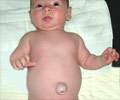A large proportion (94%) of lymphatic filariasis (LF) patients with hydrocele and their wives report the inability to have a satisfactory sexual life because of this condition.
In a new ethnographic study, published on April 21 in the open-access journal PLoS Neglected Tropical Diseases, Bontha V. Babu and his colleagues of the Indian Council of Medical Research highlight the incapacity of hydrocele patients during sexual intercourse, and its impact on marriageability of young patients in rural Orissa, India.A mosquito-borne parasitic disease, LF, also known as elephantiasis, affects 120 million people globally. The manifestations of the disease are mostly irreversible and a cause of socioeconomic and psychological problems for patients and their families. Hydrocele, an accumulation of fluid in the scrotum that causes it to swell, is one of the chronic manifestations of filariasis among men, and there are 26.8 million cases of hydrocele worldwide. The authors' interaction with patients, their wives, and community members during these studies revealed several problems related to marriage and sex due to hydrocele.
Many patients interviewed reported a feeling of shame and embarrassment, and 87% reported pain in the scrotum during intercourse. Some patients, as well as their wives, desired surgery to remove the hydrocele (hydrocelectomy), yet most have not undergone this procedure for various reasons, including the costs involved and lack of surgical facilities in rural public-health institutions. Sexual dissatisfaction and the physical and economic burdens of hydrocele were seen to contribute to a lack of happiness and communication within couples. Furthermore, women in the community said that affected men are generally seen as the "last choice" for marriage.
The objective of the morbidity management arm of the Global Programme to Eliminate Lymphatic Filariasis is to increase access to hydrocelectomy, the recommended intervention. However, the authors say, hydrocelectomy has not been emphasised by national programmes.
"We plead that the program makes its initial activities to detect hydrocele cases for referral to a facility for surgery," said Babu. The authors suggest that mass hydrocelectomy camps may be feasible initially to reduce the burden of the condition in highly endemic areas, and that hydrocelectomy should be incorporated into primary health-care services.
Source-Eurekalert
ARU














